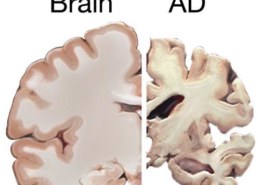What Is The Difference Between Alzheimers and Dementia
Alzheimer’s disease and dementia are usually seen in the elderly. Both diseases impair cognitive function. Alzheimer’s disease is the most common cause of dementia. Both diseases affect not only memory, but also other cognitive functions. Here we will discuss all of these in detail, highlighting their types, clinical features, signs and symptoms, causes, research and diagnosis, prognosis, treatment and care, and the difference between Alzheimer ‘s disease and dementia.
Alzheimer’s
Alzheimer’s disease is not treatable, and it progresses over time, impairing cognitive function. The occurrence and progression of Alzheimer’s disease is unique to each patient. The true cause of Alzheimer’s is still unknown. Some suggest that this is due to the formation of plaques in the brain and neural tangles. The early stage of Alzheimer’s disease is manifested by loss of memory about recent events. Over time, there are confusion, unstable mood, irritability, aggressive behavior, problems with speech and understanding, and poor long-term memory. Social interactions deteriorate as the disease progresses. Slowly, the body’s functions deteriorate, leading to death. It is very difficult to predict life expectancy and disease progression due to individual differences.
In many people, Alzheimer’s disease goes unnoticed. After diagnosis, people usually live about seven years. Only a small percentage of people live longer than fourteen years after diagnosis. Tests that evaluate thinking and behavioral abilities confirm the diagnosis of Alzheimer’s disease. Brain scans provide the key to excluding other diagnoses, such as stroke, cerebral hemorrhage, and spatial damage.

Figure 01: Alzheimers Brain
The available treatment options are not curative. They only ease the symptoms. These drugs do not affect the progression of the disease. There are various alternative treatments available, but there is no data on safety or effectiveness. The caregiver is essential in the treatment of Alzheimer’s disease.
Dementia
Dementia is characterized by a violation of all cognitive functions, in addition, due to normal aging. Dementia is a set of symptoms that can be progressive (most often) or static, resulting from degeneration of the cerebral cortex, which controls the” higher ” functions of the brain. This results in impaired memory, thinking, learning ability, language, judgment, orientation, and understanding. They are accompanied by problems with controlling emotions and behavior. Dementia is most common among the elderly, where an estimated 5% of the total population over 65 is involved. According to current statistics, dementia affects 1% of the population under the age of 65, 5-8% of people aged 65 to 74, 20% of people aged 75 to 84, and 30-50% of people aged 85 and older. Dementia covers a wide range of clinical signs.
Although there are no different types of dementia, it can be broadly divided into three according to the natural history of the disease. Fixed cognitive impairment is a type of dementia that does not progress in severity. This is the result of some organic brain disease or injury. Vascular dementia is a dementia with fixed disorders. (For example: stroke, meningitis, decreased oxygenation of cerebral circulation). Slowly progressive dementia is a type of dementia that begins as a periodic disturbance of the higher functions of the brain and slowly deteriorates to the stage where the activity of everyday life is disrupted. This type of dementia usually occurs due to diseases in which the nerves slowly degenerate (neurodegenerative). Frontotemporal dementia is a slowly progressive dementia caused by slow degeneration of the structures of the frontal lobes. Semantic dementia is a slowly progressive dementia that is characterized by the loss of the meaning of a word and the meaning of speech. Diffuse dementia of the Levi body is similar to Alzheimer’s disease, except for the presence of Levi bodies in the brain. (For example: Alzheimer’s disease, multiple sclerosis). Rapidly progressive dementia is a type of dementia that manifests itself not in years, but in just a few months. (For example: Creutzfeldt-Jakob disease, prion disease).
Treatment of any primary disorder, treating superimposed delirium, treating even minor medical problems, including family support, the provision of practical assistance at home, help for carers, drug treatment and organization-patient care in case of refusal home care are the main principles of the care of Imbeciles. Medication is only used when the possible side effects are outweighed by the benefits. For severe changes in behavior, such as arousal, emotional instability, episodic use of sedatives (Promazine, Thioridazine) is recommended. Antipsychotic drugs can be prescribed for delusions and hallucinations. If depressive traits are deep, antidepressant therapy may be initiated. Centrally acting cholinesterase inhibitors are useful for about half of patients suffering from dementia due to Alzheimer’s disease. They appear to delay the progression of cognitive impairment and in some cases may even improve symptoms for a while.
What is the difference between Alzheimer’s and Dementia?
* The curability of dementia depends on the cause, while Alzheimer’s is incurable and progressive.
* Alzheimer’s disease usually begins as a momentary amnesia, while dementia is present in a variety of ways.
* The main symptom of Alzheimer’s disease is memory loss, while dementia manifests differently depending on the type of dementia.
* Alzheimer’s disease shows loss of function in the temporal lobe during PET scans, while dementia shows global loss of function.
CREDIT
www.differencebetween.com/difference-between-alzheimers-and-dementia
Image Courtesy:
1.’Alzheimers brain’ By National Institutes of Health (Public Domain) via Commons Wikimedia



Leave an answer
You must login or register to add a new answer.